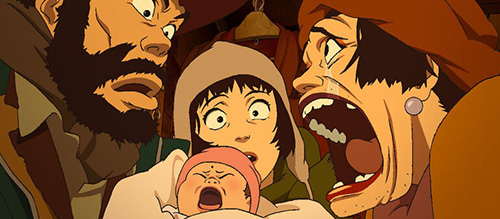Tokyo Godfathers (2003) Review
Tokyo Godfathers (2003)
Directors: Satoshi Kon, Shôgo Furuya
Screenwriters: Satoshi Kon, Keiko Nobumoto
Starring: Tôru Emori, Yoshiaki Umegaki, Aya Okamoto, Kyôko Terase, Hiroya Ishimaru
Christmas is not a time of happiness for all, in fact for a great many people it’s extremely difficult. Can you imagine being alone and on the streets at what is supposedly the most wonderful time of the year? I sincerely hope you do only have to imagine.
Satoshi Kon was an animation visionary who produced four thoughtful, striking and unique features (Perfect Blue; Millennium Actress; Tokyo Godfathers and Paprika) and one anime series (‘Paranoia Agent’) before passing away at the tragically early age of 46. Tokyo Godfathers is easily his most accessible and crowd-pleasing work, the rare Japanese Christmas movie complete with all the tropes and themes a Western audience comes to expect from such a product.
Tokyo Godfathers opens on an unusual sight – a nativity play in Japan with a mismatched pair watching in the audience. Said pair are Gin (Tôru Emori) and Hana/Uncle Bag (Yoshiaki Umegaki), and they live on the streets with teen runaway Miyuki (Aya Okamoto). The lives of all three unlikely companions are about to change as they find the most Christmassy of miracles, an abandoned baby in need of a home. As they try and survive Christmas together and get baby Kiyoko across winter Tokyo to her parents, their varied past lives catch steadily up to all of them.
Any Westerner who’s been to Japan at the right time of year knows Christmas there is a unique experience. It’s like viewing the festive season through a distorted, if focussing, lens. The iconography is all there, but in Japan it’s one of many festivals in an unreligious but spiritual nation. It’s an interesting starting point from which to make a Christmas film.
Japanese culture is unforgiving towards vagrancy and especially theft, even if you’re stealing to survive. Waling around Tokyo you might occasionally see where the homeless have spent the night on the streets, but the evidence is generally cleared away by morning. It’s not in-keeping with a sense of personal honour to ask for or receive help on the streets, or to pity those who find themselves in that situation. As a doctor says to Gin at one point without mirth, “I can try to cure disease. Lifestyle is something you have to fix”. This would make a great double bill with Hirokazu Koreeda’s Shoplifters, both films matching tone, theme and spirit so well, not to mention both being none-too-critical of contemporary Japanese attitudes to certain less privileged sectors of society.
Unlike the majority of classic anime character designs, Satoshi Kon isn’t afraid of making the people who inhabit his animated universes ugly. You’ve probably heard of “ugly crying”, Kon’s characters are into “ugly being” but are all the more expressive and compelling for all their flaws.
Tokyo Godfathers is a Christmas movie, a dysfunctional family comedy-drama and a most unconventional love story. Not many comedy-dramas end with a great action scene, even fewer relationship films follow, as two of three protagonists, a gay transvestite in love with his apparently straight divorcee friend, no physical attraction between them but plenty of affection and a shared desire to parent a teenager and a baby between them.
The film is very pro-foster families and unconventional family dynamics. Hana’s most impassioned outburst has her heartbreakingly declare, “Nothing should make you abandon a child! That means you’ve taken love and tossed it away, like trash”.
It goes a bit It’s a Wonderful Life at points with magical Christmas imagery, strange happenings and just a little schmaltz, but it’s also grounded and rooted in the real streets of Tokyo. When an angel appears to Gin and says, “What is it you desire, my magic, or an ambulance?” Gin takes the ambulance without hesitation, offending the angel, in actuality a drag queen from the same bar that Hana made her name.
The sudden plot diversion to a gangster’s wedding that happens early on admittedly doesn’t go anywhere, but otherwise Tokyo Godfathers is near-perfect in execution of a compelling animated story. Not a hair is unintentionally out of place, and speaking of hair, when we see Hana contemplating her existence on a bridge as a gust of wind catches a strand of her hair, it is one of the most beautiful hand-drawn animated moments ever put to screen, despite, and emphasised by, the relative roughness of the animation elsewhere. This is a simply magical ode to familial love, and not just at Christmas, whatever shape that family takes.
23/24


